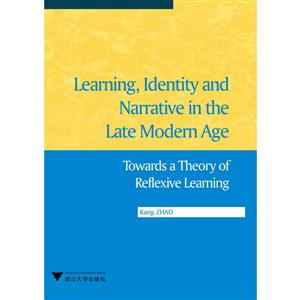-
>
妙相梵容
-
>
基立爾蒙文:蒙文
-
>
我的石頭記
-
>
心靈元氣社
-
>
女性生存戰爭
-
>
縣中的孩子 中國縣域教育生態
-
>
(精)人類的明天(八品)
晚期現代中的學習,身份認同與敘事走向一個自反性學習理論 版權信息
- ISBN:9787308135535
- 條形碼:9787308135535 ; 978-7-308-13553-5
- 裝幀:一般膠版紙
- 冊數:暫無
- 重量:暫無
- 所屬分類:>
晚期現代中的學習,身份認同與敘事走向一個自反性學習理論 本書特色
趙康編著的《晚期現代中的學習身份認同與敘事(走向一個自反性學習理論)(英文版)》是在全球化和歐洲終身學習話語這個大背景下的一個教育理論研究。它探討了為什么在20世紀后半期西方社會中“人的(自我)認同”成為一個問題,并著重考察了在晚期現代社會中“學習”在人的自我認同形成和轉化過程中所具有的角色。作者用哲學的理論視角(主要基于保羅?利科和查爾斯?泰勒的理論)分析了當代社會學中關于現代性與人的認同觀點(主要來自安東尼?吉登斯和齊格蒙特?鮑曼的觀點)和其對終身學習話語的影響。作者揭示了當代西方終身學習話語中,特別是政策話語中經濟話語的主導地位,指出終身學習話語中的道德和價值維度的缺失及其帶來的問題。本書*終提出了基于多個對立統一關系的自反性學習(reflexive learning)理論。
晚期現代中的學習,身份認同與敘事走向一個自反性學習理論 內容簡介
本書是在優選化和歐洲終身學習話語這個大背景下的一個教育理論研究。它探討了為什么在20世紀后半期西方社會中“人的(自我)認同”成為一個問題,并著重考察了在晚期現代社會中“學習”在人的自我認同形成和轉化過程中所具有的角色。作者用哲學的理論視角(主要基于保羅·利科和查爾斯·泰勒的理論)分析了當代社會學中關于現代性與人的認同觀點(主要來自安東尼·吉登斯和齊格蒙特·鮑曼的觀點)和其對終身學習話語的影響。作者揭示了當代西方終身學習話語中,特別是政策話語中經濟話語的知名品牌地位,指出終身學習話語中的道德和價值維度的缺失及其
晚期現代中的學習,身份認同與敘事走向一個自反性學習理論 目錄
Prologue
Chapter 1
The Troubled Concept of Identity
1.1 Introduction
1.2 Identity in the practical worldsociety
1.3 Identity on the theoretical level
1.3.1 Philosophical approaches to identity
1.3.2 Psychological approaches to identity
1.3.3 Sociological approaches to identity
1.4 The need of further exploration
Chapter 2
Why Has Identity Become a Problem in Modern Societies?
2.1 Introduction
2.2 Why identity and modernity?
2.3 What are modernity and modernization?
2.4 Giddens' view: Self-identity with anxieties caused by external
changes
2.4.1 Modernity
2.4.2 What is the latehigh modernity?
2.4.3 Self and self-identity in relation to the late modernity
2.4.4 Lifestyles and self-identity formation
2.5 Bauman's view: Identity as an unfulfilled project due to radical
individualism
2.5.1 What is liquid modernity?
2.5.2 Problem of identity and individual de jure
2.5.3 Citizenship and Individual de facto
2.6 Individualization, modernity and identity
2.7 Other questions related to the problem of identity
2.7.1 Where does the problem of identity exist?
2.7.2 To whom the identity has become a problem?
2.7.3 How does identity become a problem?
2.8 Critical observations
2.8.1 Different "anxieties', different identity problems
2.8.2 Criticisms towards Giddens' analyses: Radical individualism
and hidden power
2.8.3 Criticism towards Bauman
2.9 Implications for lifelong learning and some criticisms
2.10 Reflections on the notion of reflexivity in relation to identity
Chapter 3
Understanding Personal Identity Dialectically: Through the Lens of Paul
Ricoeur
3.1 Introduction: Paradoxes of personal identity
3.2 Ricoeur's view on the self: An ontological view
3.3 Ricoeur's view on personal identity: Is identity a 'thing'?
3.4 Reflexivity and the dialectical understanding of personal
identity
3.5 The role of narrative in understanding identity
Chapter 4
Does Personal Identity Matter? From Charles Taylor's Views
4.1 Introduction: Does personal identity matter?
4.2 Taylor's view on the self
4.2.1 Self in 'moral space'
4.2.2 Self in the web of interlocution
4.2.3 Self is partly constituted by its self-interpretation
4.3 Taylor's definition of identity
4.3.1 Identity as moral being
4.3.2 'Others' in moral identity
4.4 The need of narrative in moral identity
4.4.1 Self-interpretation requires language
4.4.2 Narrative is an inescapable temporal structure
4.4.3 Is narrative an inescapable structure?
Chapter 5
Lifelong Learning, Identity and Narrative in Late Modernity
5.1 Introduction
5.2 The emergence of lifelong learning: From education to learning to
lifelong learning
5.2.1 From the discourse of education to the discourse of
learning
5.2.2 Changes and lifelong learning
5.2.3 Flexibility, reflexivity and lifelong learning
5.2.4 A brief critique
5.3 Problems of the 'reflexive project of the self'
5.4 The role of narrative in lifelong learning in relation to Giddens'
analysis of identity
Chapter 6
Towards a Theory of Reflexive Learning
6.1 Introduction
6.2 Personal identity and lifelong learning
6.2.1 Personal identity as a 'thing' and as a 'being'
6.2.2 'Learning' and 'lifelong learning' that is relevant to personal
identity
6.3 A definition of learning
6.4 Views of reflexive learning that are relevant to identity at a conceptual
level
6.4.1 Reflexive learning in the dialectic between sameness and
selfhood
6.4.2 Reflexive learning in the dialectic between selfhood and
otherness
6.4.3 Reflexive learning in the dialectic between sameness and
otherness
6.4.4 Reflexive learning in the dialectic between horizontal thinking
and vertical thinking
6.5 Views of reflexive learning that are relevant to identity at a moral level
6.5.1 The dialogical self in a moral framework and reflexive
learning
6.5.2 Articulation and reflexive learning
6.5.3 Multiple moral frameworks, authenticity and reflexive
learning
6.6 The need of narrative in learning that is relevant to personal
identity
6.6.1 The need of narrative in lifelong learning concerning personal
identity at a conceptual level
6.6.2 The need of narrative in lifelong learning concerning personal
identity on a practical (moral) level
6.6.3 Narrative learning concerning identity: A theory from an
empirical research
6.7 Conclusions
Epilogue
Bibliography
Index
- >
姑媽的寶刀
- >
山海經
- >
伊索寓言-世界文學名著典藏-全譯本
- >
二體千字文
- >
李白與唐代文化
- >
龍榆生:詞曲概論/大家小書
- >
隨園食單
- >
小考拉的故事-套裝共3冊















